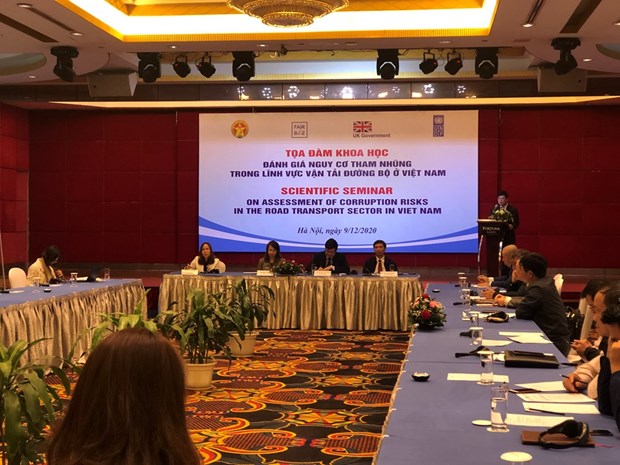Seminar discusses corruption risks in road transport in Vietnam
The Government Inspectorate of Vietnam together with the UN Development Fund (UNDP) organised a scientific seminar in Hanoi on December 9 to assess corruption risks in the country’s road transport sector.
 At the event (Source: mt.gov.vn)
At the event (Source: mt.gov.vn)Hanoi (VNA) - The Government Inspectorate of Vietnam together with the UN Development Fund (UNDP) organised a scientific seminar in Hanoi on December 9 to assess corruption risks in the country’s road transport sector.
Held as part of the UNDP’s project on promoting a fair business environment in ASEAN and sponsored by the UK Prosperity Fund, the seminar reviewed the current situation and anti-corruption regulations, while collecting feedback on draft research on corruption in road transport.
Opening the seminar, Tran Van Truong, Deputy Chief Inspector at the Ministry of Transport, said the Government has directed the implementation of several measures to improve the country’s business climate, particularly in road transport, creating positive change.
The disbursement of investment in transport projects, however, is low, partly due to corruption, which raises costs, restricts investment opportunities, and increases social inequality, he added.
Transport is a key sector in Vietnam’s economic development and of importance to domestic and foreign investors, the official said, noting that it also faces a high risk of corruption.
Diana Torres, UNDP Assistant Resident Representative in Vietnam, spoke about its technical assistance for the building of Vietnam’s revised Anti-Corruption Law, which took effect on July 1 last year.
She said that to promote an initiative on integrity between businesses and the Government in the country, the UNDP has joined the Inspectorate and the Vietnam Chamber of Commerce and Industry (VCCI) to carry out a host of activities, including seminars and forums that enabled firms to make recommendations to amend the law for better administrative procedures.
Introducing research on assessing corruption risks in Vietnam’s road transport sector, UNDP expert Nguyen Viet Hoang attributed the risks to the sector’s complexities, overlapping regulations, and lack of transparency and publicity in administrative procedures, among other reasons.
He recommended that the Vietnamese Government and the Transport Ministry continue completing the legal framework on road traffic, improve State management of the sector, and overhaul related procedures for licencing, inspection, and sanctions for violations.
Efforts to improve the capacity of public managers and law abidance in the field by citizens and businesses are also necessary, he added./.













